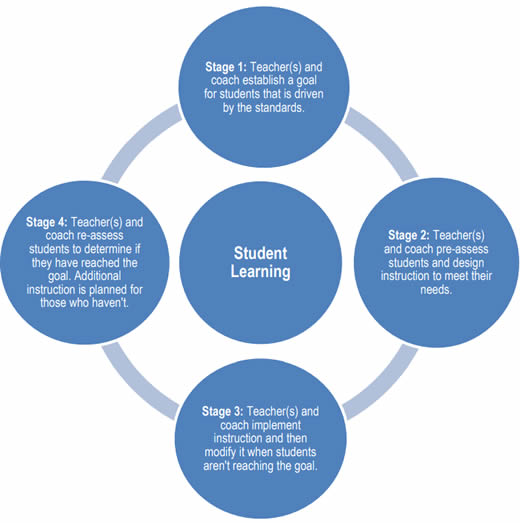Module Eleven: Activity 2
Building Your Skills as a Literacy Coach
Objectives of this Activity
- Develop and practice literacy coaching skills using a student-centered approach.
- Reflect upon your coaching experience, including comparisons/contrasts, to your colleagues’ coaching experience.
ILA Standard 2: Curriculum and Instruction
2.4 Candidates collaborate with and coach school-based educators in developing, implementing, and evaluating literacy instructional practices and curriculum.
ILA Standard 3: Assessment and Evaluation
3.2 Candidates collaborate with colleagues to administer, interpret, and use data for decision making about student assessment, instruction, intervention, and evaluation for individual and groups of students.
ILA Standard 6: Professional Learning and Leadership
6.3 Candidates develop, refine, and demonstrate leadership and facilitation skills when working with individuals or groups.
ILA Standard 7: Practicum/Clinical Experience
7.2 Candidates collaborate with and coach peers and experienced colleagues to develop, reflect on, and study their own and others’ teaching practices.
Step 1: An Introduction to Student-Coaching by Diane Sweeney
In your current or future roles as reading teachers, reading specialists, and or interventionists, literacy leadership within your schools/districts is critical to student learning and growth. Collaboration with teachers through student-centered coaching is one strategy that can support your colleagues in literacy. “By changing the focus from fixing teachers to improving student learning, the coaching paradigm can take on new meaning for us all” (Sweeney, 2011, p. 23).
Explore Sweeney's continuum of coaching here: A Continuum of Student-Centeredness in School-Based Coaching (Sweeney, 2011)
According to Sweeney (2011), student-centered coaching is about (1) setting specific targets for students that are rooted in the standards and curriculum and (2) working collaboratively to ensure that the targets are met. Rather than focusing on how teachers feel or on the acquisition of a few simple skills, we measure our impact based on student learning (p. 7). Data is at the epicenter of student-centered coaching and teacher collaboration.
Step 2: Coaching Activity
For practice in development of your literacy leadership skills, complete one of the following coaching activities:
- Example: Results-based coaching tool
- Example: Managing data across a coaching cycle
*NOTE: This coaching model is typically part of a four- to six-week coaching cycle; you can modify for this week’s module.
Do the best you can as this might be new for you in a coaching role!
We know this experience will be worthwhile for you and your teaching colleague.
This coaching activity is to be completed within one week, between you and a colleague from your school/school district.
This assignment is to meet with a teacher from the district, set a goal and fill out the coaching tools sheet.
The coaching activity is based on pre- and post-meetings/conversations and personal reflections between the two educators. The Sweeney video overviews how the coaching tools work. Overall goal is to have some practice with coaching, setting goals, and talking about students. There is really no single or “right way” to complete the coaching tools. There are many options based on conversations and students’ needs.
The teacher will enter responses for the teacher reflection column, and you will enter responses for the coach reflection column. This will be based on what was accomplished in one week. The goal is to explore the literacy coaching process and to become familiar with the terminology.

- Example: Results-based coaching tool
- Example: Managing data across a coaching cycle
All documents are linked at Sweeney’s website: https://dianesweeney.com/coachingtools/
Step 3: Share
Post your completed coaching activity on the Discussion Board.
Step 4: Give Feedback
Respond to at least two colleagues noting any similarities or differences between you and your colleagues’ coaching experiences.
Below are a few ideas you can add to your literacy toolbox for coaching conversations.
Ideas to share: Suggested language and questions for student-centered coaching
With your coaching conversation focus on student learning, you might try:
- What is it we want all students to learn?
- How will we know when each student has mastered the essential learning?
- How will we respond when a student experiences initial difficulty in learning?
- How will we deepen the learning for students who have already mastered the essential knowledge and skills? (DuFour, Eaker, & DuFour, 2005)
Or these from Sweeney (2011):
- In a perfect world, describe to me what the learning would look like among your students?
- What is your goal for students in this lesson? How will that look?
- How will we collect evidence to see what they can do?
- What are our next steps based on the evidence we collected?
Additional resources for your literacy coaching toolbox:
- Sweeney, D. (2011). Student-centered coaching: A guide for K-8 coaches and principals. Thousand Oaks, CA: Corwin.
- Student-Centered Coaching
- WI RtI Center, “Coaches”
- Spark Innovation
- Choice Literacy
- ILA Literacy Coaching for Change: Choices Matter
- ILA Standards for Middle and High School Literacy Coaches
- National Staff Development Council
Continue to Activity 3.

